肠道微生物与炎性相关疾病的免疫学研究新进展
免疫学中的研究热点与趋势

免疫学中的研究热点与趋势免疫学是研究机体免疫应答的学科,随着疫情的爆发,免疫学的重要性进一步凸显。
本文将探讨免疫学当前的研究热点与趋势。
一、微生物与宿主关系研究传统的微生物感染学主要研究微生物的病理学和病理生理学,而现在的微生物与宿主关系研究更注重微生物与宿主的共生关系。
以往认为宿主是一方面受到微生物侵害的对象,而现在越来越多的证据表明,微生物和宿主之间存在着复杂的相互作用。
例如,某些有益菌可以帮助维持宿主肠道菌群平衡,一些共生菌可帮助宿主抵御致病菌的感染等。
这种研究不仅可以深化对微生物与宿主关系的认识,还有望为新微生物治疗方法的开发提供新思路,如采用益生菌和抗菌肽等来治疗感染等。
二、免疫治疗的发展和优化传统的免疫治疗手段大多是全身性的免疫抑制,而这种手段的使用也是有很多副作用的。
相比之下,目前的研究越来越多地专注于局部免疫治疗的发展和优化,即针对某一具体病理环节进行介入治疗。
利用T细胞的反应性和特异性,尤其是开发T细胞介导的靶向治疗手段,已成为免疫治疗的重要手段。
例如,特异性肿瘤抗原(TSA)芯片技术被用来研究肿瘤生长的机理和靶向治疗策略,采用CAR-T和TCR-T等工程细胞手段旨在针对恶性肿瘤,治疗更加详尽,尤其对难治性肿瘤有着较高的治疗潜力。
三、新型疫苗研发的发展不断出现的新病原体使得疫苗研发成为免疫学界的一个永远热点。
传染病疫苗研究目标仍在扩展,包括对病原体的广谱性覆盖、对新型病原体的快速反应和知识储备、对经常发生变异的病原体的保护等。
众所周知,疫苗是预防大规模传播传染病的最经济、最有效和最可行的手段。
随着分子和细胞技术的发展,新型疫苗研发面临的挑战逐渐被解决。
诸如RNA疫苗、病毒载体疫苗、DNA疫苗等新型疫苗,都用新的纳米粒子将抗原包裹着以增强免疫效果。
四、免疫网络和细胞信号通路研究许多疾病包括癌症、自身免疫性疾病、感染病等,都与免疫网络和细胞信号通路的异常有关。
目前,研究者在深入研究免疫网络和细胞信号通路,致力于更好地理解和解决与之相关的疾病。
微生物免疫学研究进展

微生物免疫学研究进展随着微生物学和免疫学的发展,微生物免疫学研究成为了一个热门的领域。
微生物是指一类非细胞有机体,包括病原体、发酵菌、真菌、藻类、病毒等。
而免疫系统是机体内的一种自然防御系统,能够识别和抵制各种病原体的侵入。
微生物免疫学研究就是探究微生物如何与宿主的免疫系统相互作用的过程。
近年来,微生物免疫学研究的进展引起了人们的广泛关注。
以下笔者将从疫苗、免疫调节、奇异抗原等几个方面探讨微生物免疫学的最新进展。
一、疫苗研究的新突破疫苗是预防传染病最有效的手段之一。
提高疫苗的免疫效果一直是微生物免疫学研究的重要方向。
在这方面,人们已经取得了较为显著的成就。
首先,新型灭活疫苗的研发不断加快。
传统的灭活疫苗通常通过化学或物理方法将病毒或细菌完全杀死,然后注射到人体内,以引起人体免疫反应。
但是这种疫苗可能会引起副作用,且耗时较长。
目前,研究人员已经尝试使用遗传工程技术制造灭活疫苗。
这些疫苗是通过将病毒或细菌的遗传物质放入宿主细胞内,自然产生抗原,从而引起人体的免疫反应。
由此产生的抗体对于接下来的感染防范起到了重要的作用。
其次,多价疫苗制造的研究获得进展。
传统的单价疫苗只能对一个特定的病原体进行预防,而随着科学技术的发展,研究人员已经制造出了多价疫苗,能够对多种病原体进行预防。
这类疫苗不仅能够节省疫苗的种类,同时也能够降低接种的次数,让接种更加方便。
二、免疫调节的新思路一些新兴的免疫调节方法正在受到关注,这些方法通过调整宿主免疫系统的状态来达到有效的免疫防御效果。
首先,肠道菌群的调整被认为是一种新的免疫调节方法。
肠道菌群是人体内重要的细菌群落,与人类免疫系统的协调密切相关。
通过调整人体内的肠道菌群,可以增强人体免疫力,从而达到预防疾病的目的。
研究人员已经制造出了一些肠道菌群移植或口服菌群的疗法,希望通过这些手段来预防机体免疫疾病的发生。
其次,免疫组化技术是另一种新的免疫调节方法。
这种技术能够用抗体染色来标记出肿瘤细胞上特异的表面标志物。
炎症性肠病(IBD)中肠道微生物基因组学和代谢组学研究进展

炎症性肠病(IBD)中肠道微生物基因组学和代谢组学研究进展肠道内微生物种群与炎症性肠病发生和治疗效果关系密切。
肠道中的粘附于上皮细胞表面的细菌可以调控宿主T淋巴细胞,并影响机体免疫功能。
此外,肠道微生物的某些发酵产物如短链脂肪酸和鞘磷脂等产物也可以发挥调控宿主免疫力的功能。
近年来,随着宏基因组学技术和和微生物代谢组学技术的发展,使得我们有可能深入研究肠道微生物在IBD中所扮演的角色,为临床治疗IBD 疾病提供理论支持。
肠道微生物在人类健康中扮演重要的色,可以影响宿主各种免疫细胞的分化成熟以及固有层淋巴细胞的应答,抵抗肠道中病原微生物的定植等。
而肠道微生物种群的变化可能会影响肠道黏膜细胞神经递质合成,并直接影响肠道内环境的稳态和黏膜免疫屏障功能,以及先天和适应性免疫应答。
大量研究发现,肠道微生物可以通过其代谢产物影响多种疾病,包括IBD、动脉粥样硬化、哮喘和1型糖尿病等,但目前大部分疾病与肠道微生物之间的关系仍未完全明晰。
IBD包括克罗恩病(CD)和溃疡性结肠炎(UC),是目前研究最多的一种与肠道微生物相关的疾病。
现已发现IBD疾病的代谢中至少有200个与免疫学通路有关的关键检查点,包括天然的免疫、免疫应答和自噬。
自上世纪50年代开始,IBD西方国家中的发病率急剧升高,90年代后IBD的发病率已经趋于稳定,但整个病人数量仍很高,在西方国家的发病率高于0.3%。
此外,逐渐西方化和城市化的新近工业化国家的IBD发病率也在逐年提高。
这表明IBD的发生除与宿主遗传基因相关外还有个人生活习惯密切相关。
环境和肠道微生物能够调控宿主免疫应答并直接影响IBD的发生和发展。
患者个人体重指数、血糖水平、高密度脂蛋白以及胆固醇等对肠道微生物种群的塑造也发挥着不可忽略的作用。
其他影响IBD疾病发展的特定因素包括吸烟、饮食、药物治疗、生物钟和压力。
尤其是儿童时期长期使用抗生素会显著增加IBD的发病率。
并且上述影响因素与CD和UC的关系并不相同,表明IBD的发病机制我们并未完全了解。
肠道微生态未来发展趋势报告
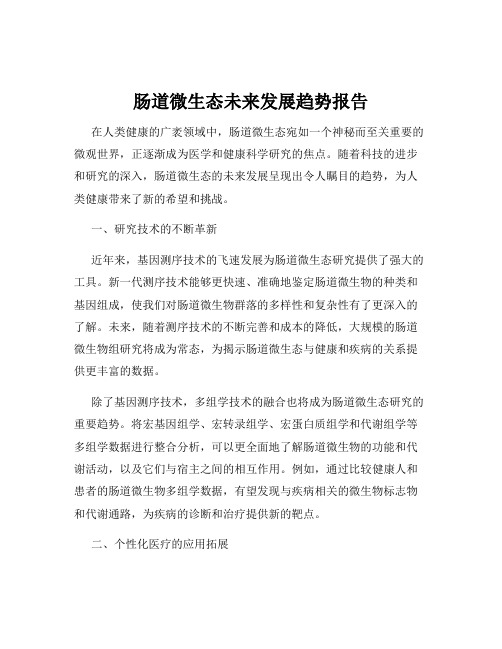
肠道微生态未来发展趋势报告在人类健康的广袤领域中,肠道微生态宛如一个神秘而至关重要的微观世界,正逐渐成为医学和健康科学研究的焦点。
随着科技的进步和研究的深入,肠道微生态的未来发展呈现出令人瞩目的趋势,为人类健康带来了新的希望和挑战。
一、研究技术的不断革新近年来,基因测序技术的飞速发展为肠道微生态研究提供了强大的工具。
新一代测序技术能够更快速、准确地鉴定肠道微生物的种类和基因组成,使我们对肠道微生物群落的多样性和复杂性有了更深入的了解。
未来,随着测序技术的不断完善和成本的降低,大规模的肠道微生物组研究将成为常态,为揭示肠道微生态与健康和疾病的关系提供更丰富的数据。
除了基因测序技术,多组学技术的融合也将成为肠道微生态研究的重要趋势。
将宏基因组学、宏转录组学、宏蛋白质组学和代谢组学等多组学数据进行整合分析,可以更全面地了解肠道微生物的功能和代谢活动,以及它们与宿主之间的相互作用。
例如,通过比较健康人和患者的肠道微生物多组学数据,有望发现与疾病相关的微生物标志物和代谢通路,为疾病的诊断和治疗提供新的靶点。
二、个性化医疗的应用拓展每个人的肠道微生物群落都具有独特性,就像指纹一样。
未来,基于肠道微生态的个性化医疗将成为现实。
通过对个体肠道微生物的检测和分析,可以为每个人制定个性化的饮食、营养补充和治疗方案。
对于某些慢性疾病,如肥胖、糖尿病和心血管疾病等,肠道微生态的失衡可能是发病的重要因素之一。
根据个体的肠道微生物特征,制定针对性的饮食干预措施,如增加膳食纤维的摄入、补充益生元或益生菌,有望改善肠道微生态平衡,从而预防和治疗这些疾病。
在肿瘤治疗方面,肠道微生态也显示出了巨大的潜力。
研究发现,肠道微生物可以影响肿瘤免疫治疗的效果。
未来,通过调节患者的肠道微生态,有望提高肿瘤免疫治疗的响应率,为癌症患者带来更好的治疗效果。
三、肠道微生态与神经系统疾病的关系研究深入越来越多的研究表明,肠道微生态与神经系统疾病之间存在着密切的联系。
免疫学的发展趋势与研究热点
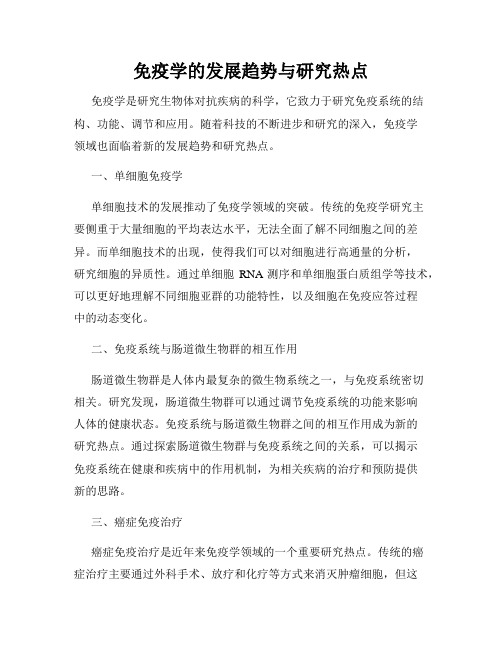
免疫学的发展趋势与研究热点免疫学是研究生物体对抗疾病的科学,它致力于研究免疫系统的结构、功能、调节和应用。
随着科技的不断进步和研究的深入,免疫学领域也面临着新的发展趋势和研究热点。
一、单细胞免疫学单细胞技术的发展推动了免疫学领域的突破。
传统的免疫学研究主要侧重于大量细胞的平均表达水平,无法全面了解不同细胞之间的差异。
而单细胞技术的出现,使得我们可以对细胞进行高通量的分析,研究细胞的异质性。
通过单细胞RNA测序和单细胞蛋白质组学等技术,可以更好地理解不同细胞亚群的功能特性,以及细胞在免疫应答过程中的动态变化。
二、免疫系统与肠道微生物群的相互作用肠道微生物群是人体内最复杂的微生物系统之一,与免疫系统密切相关。
研究发现,肠道微生物群可以通过调节免疫系统的功能来影响人体的健康状态。
免疫系统与肠道微生物群之间的相互作用成为新的研究热点。
通过探索肠道微生物群与免疫系统之间的关系,可以揭示免疫系统在健康和疾病中的作用机制,为相关疾病的治疗和预防提供新的思路。
三、癌症免疫治疗癌症免疫治疗是近年来免疫学领域的一个重要研究热点。
传统的癌症治疗主要通过外科手术、放疗和化疗等方式来消灭肿瘤细胞,但这些治疗方法对免疫系统的影响有限。
免疫治疗的出现,通过调节免疫系统的功能,激发人体免疫系统抗击肿瘤细胞的能力。
免疫检查点抑制剂和CAR-T细胞疗法等新兴免疫治疗方法的出现,为癌症治疗带来了希望。
四、免疫系统的时空调控免疫系统的时空调控是免疫学研究的一个重要方向。
免疫应答是一个高度时空调控的过程,不同免疫细胞在时间和空间上的变化对于免疫应答的发生和调控起着重要作用。
研究者们通过研究免疫细胞的时空分布、迁移机制和相互作用等方面,对免疫系统的时空调控进行深入研究,以揭示免疫应答的分子机制和调控途径。
五、人工智能在免疫学中的应用人工智能技术在医疗领域的应用日益广泛,免疫学领域也不例外。
人工智能可以帮助处理大量的免疫学数据,提供更准确的分析和预测结果。
免疫学的最新研究进展

免疫学的最新研究进展免疫学是研究机体免疫系统、免疫反应和免疫调节的科学领域。
近年来,免疫学领域取得了许多重要的研究进展,为人类的健康和疾病治疗提供了新的方向和可能性。
本文将介绍免疫学的最新研究进展,并分析其在临床应用中的前景。
一、免疫细胞治疗免疫细胞治疗是一种通过调节或改变机体免疫系统来治疗疾病的新型疗法。
其中最著名的就是CAR-T细胞治疗,即通过改造患者自身的T细胞,使其在体外表达特定受体,然后再重新注入患者体内,以增强患者免疫系统对抗癌症的能力。
这一疗法已经在多种恶性肿瘤治疗中取得了显著的疗效,为晚期癌症患者带来了希望。
二、肠道微生物和免疫系统的相互作用肠道微生物组是指人体消化道中居住的各种微生物群落。
它们与人体的免疫系统存在着复杂的相互作用关系。
最新研究表明,肠道微生物组的失调可能会导致免疫系统异常激活,从而引起一系列炎症性疾病,如炎症性肠病和自身免疫性疾病。
因此,通过调节肠道微生物组的平衡,可能可以预防和治疗这些疾病,并提高免疫系统的整体功能。
三、单细胞免疫组学传统的免疫学研究通常是基于大量细胞的平均表达水平进行分析,忽略了不同细胞在免疫反应中的异质性。
而单细胞免疫组学的发展,使得研究人员能够对单个免疫细胞进行深入的分析。
这一技术的出现不仅提供了免疫系统的全景图,还发现了许多以前未知的细胞亚群和新的免疫细胞类型,这对于研究免疫反应的调控机制、发现新的免疫疗法具有重要意义。
四、免疫检查点抑制剂免疫检查点抑制剂是一类能够抑制肿瘤对免疫系统的抑制信号的药物。
这类药物在近年来的临床应用中取得了显著的突破,被认为是肿瘤治疗的一大进展。
免疫检查点抑制剂可以激活患者自身的免疫系统,增加对肿瘤细胞的攻击力,从而达到治疗肿瘤的效果。
它不仅被应用于多种恶性肿瘤的治疗,还显示出在肿瘤预防、治疗其他疾病(如感染性疾病和自身免疫性疾病)方面的潜力。
五、疫苗设计与新型疫苗的开发免疫学的另一个重要进展是疫苗设计与新型疫苗的开发。
炎性肠病肠道免疫学的研究进展_徐超
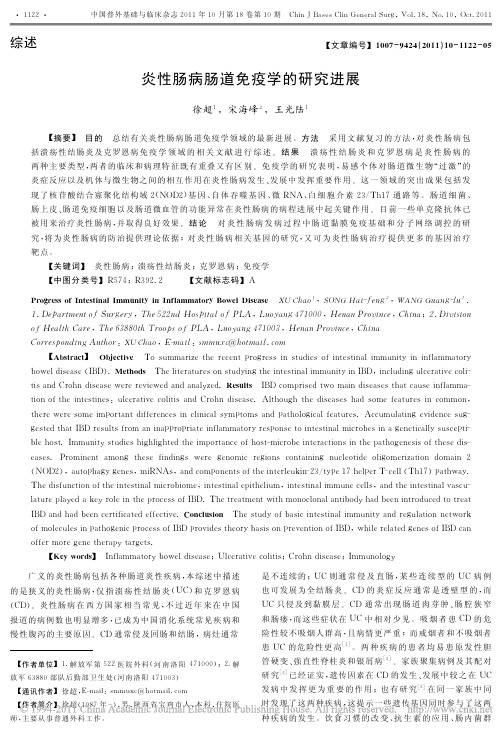
综述【文章编号】1007-9424(2011)10-1122-05炎性肠病肠道免疫学的研究进展徐超1,宋海峰2,王光陆1【摘要】 目的 总结有关炎性肠病肠道免疫学领域的最新进展。
方法 采用文献复习的方法,对炎性肠病包括溃疡性结肠炎及克罗恩病免疫学领域的相关文献进行综述。
结果 溃疡性结肠炎和克罗恩病是炎性肠病的两种主要类型,两者的临床和病理特征既有重叠又有区别。
免疫学的研究表明,易感个体对肠道微生物“过激”的炎症反应以及机体与微生物之间的相互作用在炎性肠病发生、发展中发挥重要作用。
这一领域的突出成果包括发现了核苷酸结合寡聚化结构域2(NOD2)基因、自体吞噬基因、微RNA、白细胞介素23/Th17通路等。
肠道细菌、肠上皮、肠道免疫细胞以及肠道微血管的功能异常在炎性肠病的病程进展中起关键作用。
目前一些单克隆抗体已被用来治疗炎性肠病,并取得良好效果。
结论 对炎性肠病发病过程中肠道黏膜免疫基础和分子网络调控的研究,将为炎性肠病的防治提供理论依据;对炎性肠病相关基因的研究,又可为炎性肠病治疗提供更多的基因治疗靶点。
【关键词】 炎性肠病;溃疡性结肠炎;克罗恩病;免疫学【中图分类号】R574;R392.2 【文献标志码】AProgress of Intestinal Immunity in Inflammatory Bowel Disease XU Chao1,SONG Hai-feng2,WANG Guang-lu1.1.Department of Surgery,The 522nd Hospital of PLA,Luoyang 471000,Henan Province,China;2.Divisionof Health Care,The 63880th Troops of PLA,Luoyang 471003,Henan Province,ChinaCorresponding Author:XU Chao,E-mail:smmuxc@hotmail.com【Abstract】 Objective To summarize the recent progress in studies of intestinal immunity in inflammatorybowel disease(IBD).Methods The literatures on studying the intestinal immunity in IBD,including ulcerative coli-tis and Crohn disease were reviewed and analyzed.Results IBD comprised two main diseases that cause inflamma-tion of the intestines:ulcerative colitis and Crohn disease.Although the diseases had some features in common,there were some important differences in clinical symptoms and pathological features.Accumulating evidence sug-gested that IBD results from an inappropriate inflammatory response to intestinal microbes in a genetically suscepti-ble host.Immunity studies highlighted the importance of host-microbe interactions in the pathogenesis of these dis-eases.Prominent among these findings were genomic regions containing nucleotide oligomerization domain 2(NOD2),autophagy genes,miRNAs,and components of the interleukin-23/type 17helper T-cell(Th17)pathway.The disfunction of the intestinal microbiome,intestinal epithelium,intestinal immune cells,and the intestinal vascu-lature played a key role in the process of IBD.The treatment with monoclonal antibody had been introduced to treatIBD and had been certificated effective.Conclusion The study of basic intestinal immunity and regulation networkof molecules in pathogenic process of IBD provides theory basis on prevention of IBD,while related genes of IBD canoffer more gene therapy targets.【Key words】 Inflammatory bowel disease;Ulcerative colitis;Crohn disease;Immunology 广义的炎性肠病包括各种肠道炎性疾病,本综述中描述的是狭义的炎性肠病,仅指溃疡性结肠炎(UC)和克罗恩病(CD)。
增强免疫力的新途径免疫学研究的最新进展

增强免疫力的新途径免疫学研究的最新进展在如今全球疫情爆发的背景下,人们对于免疫力的重视程度达到了前所未有的高度。
随着科学技术的不断进步,免疫学研究也在不断取得新的突破。
本文将为您介绍增强免疫力的新途径以及免疫学研究的最新进展。
一、肠道微生物与免疫力肠道微生物是指人体消化道中寄生的微生物群落。
近年来的研究表明,肠道微生物与免疫力之间存在着密切的关系。
肠道微生物可以通过调节宿主免疫系统,增强免疫力,对抗疾病。
因此,改善肠道微生物的平衡成为增强免疫力的新途径之一。
研究发现,随着人们生活方式的改变,肠道微生物的多样性在逐渐减少,这对免疫系统是不利的。
然而,通过调整饮食结构和增加益生菌的摄入,可以有效改善肠道微生物的平衡,从而增强免疫力。
此外,早期研究还表明,在肠道微生物移植的过程中,可能会存在一种"超级免疫力"现象,即通过将健康人的肠道微生物移植给免疫系统较弱的人,可以有效增强其免疫力。
二、免疫细胞工程免疫细胞工程是指通过基因技术对免疫细胞进行改造,使其具有更强的免疫力。
近年来,T细胞免疫疗法成为免疫学研究的热点之一。
通过使用CRISPR-Cas9等基因编辑技术,可以对T细胞进行精确的基因改造,使其具有更强的杀伤力和更好的长期存活性。
研究人员通过改造T细胞的受体,使其能够更精确地识别并攻击癌细胞,从而提高了免疫细胞对肿瘤的杀伤效果。
此外,还有研究人员成功地将抗体基因导入到T细胞中,使其成为具有双重攻击功能的"特异性杀伤细胞"。
这些免疫细胞工程的创新使得免疫疗法成为可能,为癌症等疾病的治疗带来了新的希望。
三、RNA疫苗的突破随着新冠疫苗的研发和应用,RNA疫苗成为了人们关注的热点。
RNA疫苗通过注射人体细胞中的RNA分子,使其产生疫苗所需的抗原蛋白,从而刺激免疫系统产生免疫应答。
与传统疫苗相比,RNA疫苗具有研发周期短、生产速度快等优势。
新冠疫苗的成功研发和应用为RNA疫苗的发展奠定了基础。
肠道菌群影响免疫治疗的机制及临床研究进展

肠道菌群影响免疫治疗的机制及临床研究进展整理:肿瘤资讯来源:肿瘤资讯免疫治疗是肿瘤治疗的一种突破性技术,明显的延长了肿瘤患者的生存期,改善了患者的生活质量。
然而这种疗法只能使少数患者受益,因此研究并开发提高免疫治疗疗效的方法具有重要意义。
肠道菌群被认为对肿瘤免疫治疗的成功有重要的贡献。
研究表明,肠道菌群的存在、组成和多样性水平直接影响患者的肿瘤治疗效果,并且免疫应答效率能通过粪菌移植或有益菌干预而改善。
肠道的特征菌群与宿主肿瘤微环境树突状细胞的抗原呈递功能和效应性T淋巴细胞的活性有显著的相关性。
这种菌群‐免疫之间的调控机制很大程度上是由肠道菌群代谢产生的短链脂肪酸或次级胆汁酸等物质通过配体‐受体的关系调控宿主基因表达,调节免疫细胞分化及活性实现。
另外,肠道细菌还可能通过易位定植于肿瘤组织进而刺激免疫反应。
基于这些菌群与免疫关系的研究,可确信通过避免使用抗生素、粪菌移植和益生菌干预的方法,改善或维持健康的肠道菌群结构,是优化肿瘤免疫治疗的有效途径。
本文综述了肠道菌群参与调控免疫治疗潜在的分子机制及相关领域的研究进展,为进一步利用益生菌调节肠道菌群并促进肿瘤免疫治疗效率的研究提供理论支持。
关键词:肠道菌群代谢产物免疫治疗免疫治疗是当前用于科学研究和临床治疗多种恶性肿瘤的一种新方法,其中免疫检查点阻断(immune checkpoint blockade, ICB)主要是利用免疫检查点抑制剂(immune checkpoint inhibitors,ICIs)拮抗肿瘤的免疫逃逸,促进T细胞在肿瘤组织的浸润,提高效应T细胞对肿瘤细胞的杀伤作用,从而重启和放大肿瘤‐免疫循环,实现肿瘤的免疫治疗[1,2]。
然而这一方法仅在少数患者中起到有效的治疗作用,疗效的差别可归因于肿瘤的不同类型及患者的个体差异,这与患者肠道菌群组成密切相关[3]。
本文综述了肠道菌群参与调控免疫治疗相关领域的研究进展以及潜在的分子机制,为进一步利用益生菌调节肠道菌群并促进肿瘤免疫治疗疗效的研究提供理论支持。
肠道Akkermansia muciniphila研究最新进展(完整版)

肠道Akkermansia muciniphila研究最新进展(完整版)随着厌氧培养技术的发展,2004年Derrien等[1]首次从健康人体粪便中分离出Akkermansia muciniphila (A. muciniphila) 。
研究发现,A. muciniphila主要定植在胃肠道的外黏液层,以胃肠道的黏蛋白作为自身生长的碳和氮来源,其消耗黏蛋白与杯状细胞再生黏蛋白能够达到动态平衡,从而维持黏液层稳定。
A.muciniphila以及其分泌物,如囊泡(Extracellular vesicles, EV)通过与结肠上皮细胞Toll受体(Toll-like receptor,TLR)结合及调节紧密连接蛋白的表达等来维持肠道稳态,从而改善高脂饮食诱导的肥胖和炎症性肠病(Inflammatory bowel disease, IBD)等疾病[2]。
本文基于现有的国内外研究,对A. muciniphila的基本特性、定植情况、影响定植的因素,以及成为下一代益生菌所面临的难点等进行综述。
1 A. muciniphila的基本特性及作用1.1 A. muciniphila的基本特性A. muciniphila是一种严格厌氧、非运动、没有内生孢子的卵圆形肠道细菌,其最适生长温度是37℃,最适生长pH为6.5,该菌的倍增时间大约是1.5 h[1]。
A. muciniphila单独或者成对存在,很少成链生长,其代谢产物为乙酸盐、丙酸盐、1,2-丙二醇等。
在提供蛋白源的基础培养基中,加入N-乙酰氨基葡萄糖、N-乙酰半乳糖胺和葡萄糖作为能源,A.muciniphila可以生长,但是在果糖和纤维二糖等其他糖类作为能源的培养基中A. muciniphila不能生长[1]。
Ouwerkerk等[3]研究发现,A. muciniphila具有一定的耐氧性,其暴露在空气中24 h,仍然有1%以上的存活率。
此外,研究还发现低氧气浓度(纳摩尔)下可以显著促进A. muciniphila的生长。
免疫学研究的新进展和应用前景展望

免疫学研究的新进展和应用前景展望免疫学研究作为一个重要的领域,对于预防和治疗各种疾病都有着不可忽视的作用。
随着科技的不断发展,免疫学研究的成果也不断涌现。
本文将介绍最新的免疫学研究进展以及它们的应用前景展望。
一、单克隆抗体治疗单克隆抗体治疗是免疫学研究领域近年来的重大突破,它是一种利用人工合成的抗体来攻击特定的癌细胞或感染病原体的方法。
单克隆抗体对于治疗癌症、炎症、风湿性关节炎和自身免疫性疾病等方面都有很大的潜力。
目前已经有多种单克隆抗体投入到了临床治疗当中,例如HER2阳性乳腺癌、肾细胞癌、结肠癌和黑色素瘤等。
单克隆抗体治疗的优点在于其针对性强、安全性高、副作用少等方面。
虽然目前的单克隆抗体治疗价格较昂贵,但是随着技术的不断发展,相信会逐渐降低成本,使更多的人能够受益。
二、CAR-T细胞治疗CAR-T细胞治疗是一种利用体外选择和改造患者T细胞,使其识别癌细胞并摧毁它们的方法。
该方法可以在短时间内提高治疗效果,并且对患者的免疫系统没有长期影响。
CAR-T细胞治疗适用于多种癌症,例如淋巴瘤、白血病和肺癌等。
虽然CAR-T细胞治疗很有前景,但是它同时也面临一些挑战,例如CAR-T细胞治疗后出现的细胞因子释放综合征和神经毒性等问题。
此外,CAR-T细胞治疗的高成本成为了限制其普及的一大因素。
三、肠道微生物群的研究肠道微生物群是指人体正常肠道内共生的微生物群落,它们的种类和数量与人体的健康状况密切相关。
近年来的研究表明,肠道微生物群可以影响人体的免疫功能、代谢功能、神经系统等多个方面。
肠道微生物群的研究已经取得了一些突破性进展。
例如,研究人员发现某些肠道微生物的存在与自闭症、肥胖症、慢性肝病等疾病的发生有关。
此外,一些研究发现肠道微生物群可以通过肠-脑轴的相互作用来影响情绪和压力反应等方面。
肠道微生物群的研究有助于我们更好地了解人体的健康与疾病的发生。
目前还需要进一步的研究,才能发现更多的相关性和可能的治疗方案。
免疫系统生物学研究的新进展
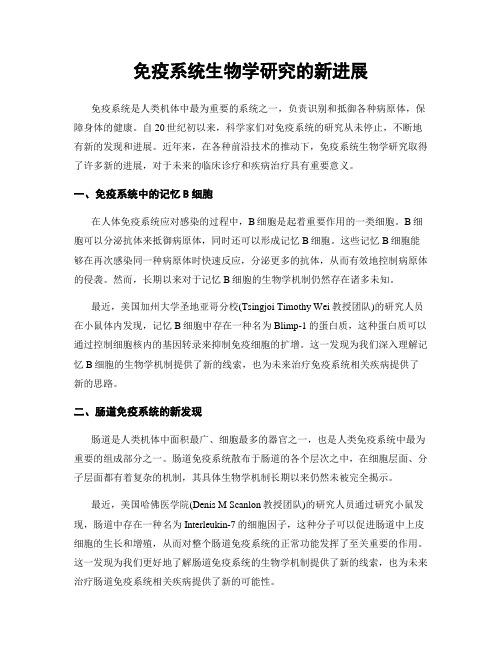
免疫系统生物学研究的新进展免疫系统是人类机体中最为重要的系统之一,负责识别和抵御各种病原体,保障身体的健康。
自20世纪初以来,科学家们对免疫系统的研究从未停止,不断地有新的发现和进展。
近年来,在各种前沿技术的推动下,免疫系统生物学研究取得了许多新的进展,对于未来的临床诊疗和疾病治疗具有重要意义。
一、免疫系统中的记忆B细胞在人体免疫系统应对感染的过程中,B细胞是起着重要作用的一类细胞。
B细胞可以分泌抗体来抵御病原体,同时还可以形成记忆B细胞。
这些记忆B细胞能够在再次感染同一种病原体时快速反应,分泌更多的抗体,从而有效地控制病原体的侵袭。
然而,长期以来对于记忆B细胞的生物学机制仍然存在诸多未知。
最近,美国加州大学圣地亚哥分校(Tsingjoi Timothy Wei教授团队)的研究人员在小鼠体内发现,记忆B细胞中存在一种名为Blimp-1的蛋白质,这种蛋白质可以通过控制细胞核内的基因转录来抑制免疫细胞的扩增。
这一发现为我们深入理解记忆B细胞的生物学机制提供了新的线索,也为未来治疗免疫系统相关疾病提供了新的思路。
二、肠道免疫系统的新发现肠道是人类机体中面积最广、细胞最多的器官之一,也是人类免疫系统中最为重要的组成部分之一。
肠道免疫系统散布于肠道的各个层次之中,在细胞层面、分子层面都有着复杂的机制,其具体生物学机制长期以来仍然未被完全揭示。
最近,美国哈佛医学院(Denis M Scanlon教授团队)的研究人员通过研究小鼠发现,肠道中存在一种名为Interleukin-7的细胞因子,这种分子可以促进肠道中上皮细胞的生长和增殖,从而对整个肠道免疫系统的正常功能发挥了至关重要的作用。
这一发现为我们更好地了解肠道免疫系统的生物学机制提供了新的线索,也为未来治疗肠道免疫系统相关疾病提供了新的可能性。
三、免疫系统突变与免疫性疾病免疫系统的正常功能对于维护人体健康至关重要。
而一旦免疫系统出现异常,就会导致一系列严重的免疫性疾病,例如风湿性关节炎、自身免疫性疾病、免疫缺陷病等。
免疫学探索肠道免疫系统的功能与调节

免疫学探索肠道免疫系统的功能与调节免疫学是研究机体对抗病原微生物和其他外源性物质的一门学科,而肠道免疫系统则是机体免疫系统中一个重要的组成部分。
肠道免疫系统具有多种功能,并通过调节机体免疫反应维持肠道的稳态。
本文将探讨肠道免疫系统的功能与调节,并阐述其在人体健康中的重要性。
一、肠道免疫系统的功能肠道免疫系统是机体最大的免疫系统,其主要功能如下:1. 抗病原微生物作用:肠道是机体与外界环境的接触界面,容易受到各类病原微生物的感染。
肠道免疫系统通过多种机制,如黏膜屏障、抗菌肽和免疫细胞的介入等,保护机体免受致病微生物侵袭。
2. 免疫耐受:肠道免疫系统在正常情况下对食物和肠道共生菌等非病原微生物保持免疫耐受。
这种免疫耐受机制能够防止机体对自身组织或正常菌群产生过度免疫反应,维持肠道内的和谐环境。
3. 免疫记忆:肠道免疫系统具有免疫记忆的功能,即在第一次感染后,对同一病原微生物再次感染时可以迅速做出针对性的免疫应答,使机体更加抵御病原微生物的入侵。
二、肠道免疫系统的调节肠道免疫系统的功能是通过多种机制来调节和平衡的,常见的调节机制有以下几种:1. 免疫细胞的介入:肠道免疫系统中的免疫细胞如巨噬细胞、树突状细胞和淋巴细胞等起着关键作用。
它们能够识别和捕获病原微生物,并通过分泌细胞因子等方式调节免疫反应的强度和方向。
2. 免疫球蛋白的产生:肠道黏膜层存在大量的浆细胞,能够产生免疫球蛋白,包括IgA、IgM和IgG等。
免疫球蛋白在肠道内形成抗体屏障,能够中和病原微生物的毒性及其毒素,防止它们依附肠黏膜并入侵机体。
3. 肠道共生菌的调节:肠道内存在大量的共生菌,它们与机体形成共生关系并参与肠道免疫调节。
共生菌通过调控肠道免疫细胞的活性、促进免疫耐受发生以及抑制病原微生物的生长等方式,维护肠道免疫系统的稳态。
三、肠道免疫系统对人体健康的重要性肠道免疫系统对人体健康具有重要意义。
一方面,它能够保护机体免受病原微生物的侵害,起到防御感染的作用。
肠道菌群调控与免疫治疗的研究进展

肠道菌群调控与免疫治疗的研究进展近年来,肠道菌群调控与免疫治疗的研究引起了广泛关注。
肠道菌群是人体内最庞大的菌群之一,对免疫系统的调节具有重要作用。
本文将从菌群的组成和功能、肠道菌群与免疫系统的相互作用以及免疫治疗中菌群调控的研究进展等方面进行论述。
一、菌群的组成和功能肠道菌群是指人体消化道中共生的微生物群落,主要包括细菌、真菌、病毒等多种微生物。
肠道菌群的组成和数量会受到多种因素的影响,包括饮食结构、环境因素、遗传因素等。
菌群的组成多样性和平衡状态对人体健康具有重要影响。
肠道菌群的功能非常多样,其中最重要的就是对免疫系统的调节。
菌群通过抑制病原微生物的生长、促进食物消化和吸收、合成维生素等方式维护肠道健康。
此外,菌群还能够通过调节免疫反应、影响肠道黏膜屏障、调节肠道神经活动等途径,对免疫系统起到重要的调节作用。
二、肠道菌群与免疫系统的相互作用肠道菌群与免疫系统之间存在着复杂而密切的相互作用关系。
首先,菌群通过抑制有害微生物的生长,维持肠道的微生态平衡,从而降低了感染的风险。
其次,菌群能够通过调节免疫反应,影响免疫系统的稳定性和免疫应答的强度。
最后,菌群还能够通过调节肠道黏膜屏障的完整性,防止病原微生物进入人体内部。
肠道菌群与免疫系统的相互作用还体现在对自身免疫性疾病、过敏反应等疾病的影响上。
研究发现,肠道菌群的异常可以导致免疫系统的异常应答,进而引发自身免疫性疾病的发生。
此外,菌群的紊乱还可能导致机体免疫系统对自身组织的攻击,从而引发过敏反应。
三、免疫治疗中菌群调控的研究进展近年来,提高肠道菌群的调控能力已成为免疫治疗的一个重要研究方向。
研究人员通过调节菌群的组成和数量,试图实现对免疫系统的精准调控,以达到治疗疾病的目的。
目前,常用的菌群调控方法主要包括益生菌和粪菌移植。
益生菌是一类能够促进肠道健康的有益微生物。
研究表明,益生菌可以通过调节免疫反应、增加肠道黏膜屏障的完整性等途径,对多种疾病具有预防和治疗的作用。
肠道菌群在自身免疫性疾病中的研究进展

国际免疫学杂志2021年1月第44卷第1期丨n t J丨mmunol,Jan.2021,V〇1.44,N〇.l• 91 ••综述•肠道菌群在自身免疫性疾病中的研究进展郭风宜1杨潇2高天舒31辽宁中医药大学研究生学院,沈阳11〇847;2辽宁中医药大学附属第二医院内分泌科,沈阳丨10034;3辽宁中医药大学附属医院内分泌科,沈阳110032通信作者:杨潇,Emai丨:17924糾8 @qq•com,电话:024_86802881【摘要1自身免疫性疾病(autoimmune disease, A I D)通过自身产抗体,导致免疫耐受失衡,而起的一系列慢性炎症反应,甚至对机体组织造成损伤。
目前All)发病率逐渐升高,而其确切的发病机制尚不明确肠道菌群作为人体最大的“免疫器官”,参与机体代谢,形成肠粘膜屏障,维持免疫功能1丨_:常随#对人体肠道菌群研究的深入,越来越多的结果表明肠道菌群在自身免疫反应过程中起到重要作用,可能成为今后临床对于All)治疗的新靶点文章就肠道菌群及其在All)中的研究进展进行简要概述。
【关键词】肠道菌群;自身免疫性疾病;免疫反应基金项目:国家自然科学基金(81503474,81874441 );辽宁省科技厅自然基金项目(2019-MS-207 );辽宁省教育厅项目(L201923 );辽宁中医药大学中医脏象理论及应用国家教育部重点实验室项H(zyzxl804)D O I:10. 3760/cma. j. issn. 1673^394. 2021.01.016Research progress of gut microbiota in autoimmune diseasesGuo Fengyi',Ycmg Xiao_,Gao Tianshu、^Graduate School, Liaoning University o f Traditional Chinese Medicine .Shenyang W0S41 .China Department ofEndocrinology y the Second Affiliated Hospital, Shenyang1\ 0034 .China DefKirtment o f Endocrinology^ AffiliatedHospital o f Liaoning University o f Traditional Chinese Medicine, Shenyang110032, ChinaCorresponding author:Yang Xiao, Email: 17924948@ qq. com , Tel:************【A bstract】Autoimmune diseases ( AID) cause a series of chronic inflammatory reactions by the production of antibodies,leading to imbalance of immune tolerance,and even damage the body tissues. The incidence ofAID has been increasing in recent year,l>ut the exact pathogenesis is unclear. As the largest " immune organ" ofhuman body,gut microbiota participales in the organic metabolism,forming intestinal mucosal barrier and maintaining normal immune function. With the further research on gut microbiota, more and more research resultsshow that gut microbiota plays an important role in the process of auloimmune response, which may be a newiherapeutic target for AIL). In this paper,the gut microbiota and its research progress in AID were briefly summarized.【Key words】Gut microbiota;Autoimimme disease;Immune responseFund program :National Natural Science Foundation(81503474,81874441 ) ;IJaoning Provincial Department of Science and Technology Natural Fund Project(2019-MS-207) ; Liaoning Provincial Departmenl of Kdu-cation Project( L201923) ;Key Laboratory Project of the Ministry of Education for the Theory and Application ofTCM Viscera of Liaoning University of Traditional Chinese Medicine( Zyzx1804)DOI : 10. 3760/cma. j. issn. 16734394. 2021.01.016自身免疫性疾病(a u t o i m m u n e disease,A I D)是 并损害机体的慢性炎症性疾病,其发病率逐年升高,一种对自身抗原发生免疫反应,产生大量淋巴细胞,但发病机制尚不明确目前治疗以对症治疗为主,• 92•国际免疫~?:杂忐2021<|:I)|第44卷第I期丨丨丨丨J Immum丨U i m.202l ,V〇l.44,!\(>. I激素或诘抗剂控制炎症或者手术治疗都不能彻底治 愈,只能缓解症状。
免疫学与肠道疾病菌群失调与炎症性肠病
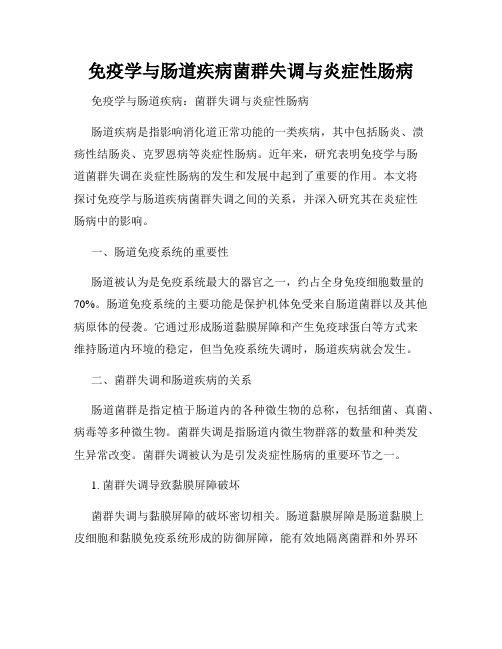
免疫学与肠道疾病菌群失调与炎症性肠病免疫学与肠道疾病:菌群失调与炎症性肠病肠道疾病是指影响消化道正常功能的一类疾病,其中包括肠炎、溃疡性结肠炎、克罗恩病等炎症性肠病。
近年来,研究表明免疫学与肠道菌群失调在炎症性肠病的发生和发展中起到了重要的作用。
本文将探讨免疫学与肠道疾病菌群失调之间的关系,并深入研究其在炎症性肠病中的影响。
一、肠道免疫系统的重要性肠道被认为是免疫系统最大的器官之一,约占全身免疫细胞数量的70%。
肠道免疫系统的主要功能是保护机体免受来自肠道菌群以及其他病原体的侵袭。
它通过形成肠道黏膜屏障和产生免疫球蛋白等方式来维持肠道内环境的稳定,但当免疫系统失调时,肠道疾病就会发生。
二、菌群失调和肠道疾病的关系肠道菌群是指定植于肠道内的各种微生物的总称,包括细菌、真菌、病毒等多种微生物。
菌群失调是指肠道内微生物群落的数量和种类发生异常改变。
菌群失调被认为是引发炎症性肠病的重要环节之一。
1. 菌群失调导致黏膜屏障破坏菌群失调与黏膜屏障的破坏密切相关。
肠道黏膜屏障是肠道黏膜上皮细胞和黏膜免疫系统形成的防御屏障,能有效地隔离菌群和外界环境。
当菌群失调时,黏膜屏障易受到破坏,导致炎症性细胞因子的释放和病原菌的侵袭,从而引发炎症性肠病。
2. 菌群失调引发免疫系统异常激活菌群失调能够引发免疫系统异常激活,进而导致炎症性肠病的发生。
在正常情况下,免疫系统能够识别和清除病原菌和有害物质,以维护肠道内环境的稳定。
然而,当菌群失调时,免疫系统被过度激活,导致免疫细胞释放大量炎症因子和毒素,引发炎症性肠病。
三、肠道疾病中的免疫学角色免疫系统在炎症性肠病中起到了至关重要的作用,它能够调节炎症反应和肠道组织修复,对炎症性肠病的治疗至关重要。
1. 免疫系统的抑制作用在炎症性肠病的发展过程中,免疫系统的异常激活会导致大量炎症因子的释放和破坏性炎症反应的产生。
因此,通过抑制免疫系统的活性,可以有效地减轻炎症性肠病的临床症状。
免疫学基础研究的新进展

免疫学基础研究的新进展随着科学技术的发展,免疫学成为了当今医学领域的前沿科学。
近年来,免疫学基础研究在理解和预防人类疾病方面取得了许多新的进展。
本文将讨论其中一些最新的发现和其意义。
1. 免疫细胞信号传导的新认识我们知道,当外界的病原体进入人体后,人体的免疫系统会启动,分泌细胞因子和抗体,诱导免疫细胞参与抗病毒感染的免疫反应。
然而,这些免疫细胞信号是否会进一步传递到细胞核中影响基因表达,一直以来都是一个不太清楚的问题。
最近的研究表明,个别免疫细胞的信号可以进入细胞核,并调控基因表达,从而影响免疫系统的反应。
例如,研究者发现,在T细胞的抗原受体信号通路中,有一种蛋白质(称为NFAT)可以进入细胞核,并调控基因表达,从而控制T细胞的增殖和分化。
这项研究的意义在于,有可能利用这些新发现的机制,开发新的免疫治疗手段,帮助人类预防和治疗各种疾病。
2. 各种细胞亚群的发现我们知道,人类的免疫系统是由多种细胞组成的。
在过去的几十年里,人们已经发现了许多不同类型的免疫细胞,其中包括T细胞、B细胞、单核细胞等等。
最近,研究者通过单细胞RNA序列技术发现了许多新的免疫细胞亚群,包括具有抗肿瘤功能的天然杀伤细胞和特异性记忆T细胞等。
这项技术的发展使得人们可以更好地理解各种免疫细胞的功能和作用机制,为预防和治疗人类疾病提供了新的线索。
3. 免疫系统调控肠道微生物群的新认识肠道微生物群是人体的一个重要组成部分,它对人体的健康有着重要的作用。
最近的研究表明,免疫系统可以调控肠道微生物群的构成和功能,从而影响人体的健康状态。
例如,研究者发现,T细胞可以识别并控制某些菌株的增殖,从而减少肠道的某些疾病或症状发生的几率。
这项研究的意义在于,使人们更加了解免疫系统和肠道微生物群之间的关系,并为预防和治疗许多肠道相关的疾病(如自体免疫性肠炎等)提供了新的思路。
总之,随着科学技术的不断提高,免疫学基础研究不断取得新的进展。
这些新发现的意义不仅在于我们更好地了解免疫系统的基本机制,还在于为预防和治疗一系列疾病提供了新的线索和思路。
- 1、下载文档前请自行甄别文档内容的完整性,平台不提供额外的编辑、内容补充、找答案等附加服务。
- 2、"仅部分预览"的文档,不可在线预览部分如存在完整性等问题,可反馈申请退款(可完整预览的文档不适用该条件!)。
- 3、如文档侵犯您的权益,请联系客服反馈,我们会尽快为您处理(人工客服工作时间:9:00-18:30)。
Advances in Microbiology 微生物前沿, 2018, 7(1), 12-18Published Online March 2018 in Hans. /journal/ambhttps:///10.12677/amb.2018.71002Recent Advances in Immunological Studies of Intestinal Microbes and InflammatoryRelated DiseasesZeqing Chen, Jianxin Wen*College of Veterinary Medicine, Qingdao Agriculture University, Qingdao ShandongReceived: Mar. 2nd, 2018; accepted: Mar. 16th, 2018; published: Mar. 23rd, 2018AbstractThe relationship between the body’s own immune system and intestinal flora is not only coexist-ing, but also affecting each other. Recent studies have shown that metabolic diseases such as di-abetes, gout, hyperuricemia and other metabolic diseases are closely related to changes in intes-tinal flora. The detection of intestinal flora change may be helpful to the diagnosis and treatment of metabolic diseases. The intestinal microflora of the healthy population and patients with meta-bolic diseases are different, we can use the drugs and the role of diet, and readjust the distribution of intestinal microflora, which is conducive to disease remission and composition. This article re-viewed the pathogenesis of diabetes, hyperuricemia, inflammatory bowel disease and gout, the me-chanism of intestinal flora and the development of diagnosis and treatment strategy of the disease.KeywordsEnteric Microbiota, Inflammatory Related Diseases, Immunological Study肠道微生物与炎性相关疾病的免疫学研究新进展陈泽庆,温建新*青岛农业大学动物医学院,山东青岛收稿日期:2018年3月2日;录用日期:2018年3月16日;发布日期:2018年3月23日*通讯作者。
陈泽庆,温建新摘要人体自身免疫系统与肠道菌群存在着互相影响的关系。
近年大量研究表明,代谢性疾病如糖尿病、痛风、慢性肝炎等的出现与肠道菌群的变化密切相关。
健康人群和代谢性疾病患者的肠道微生物有不同程度的差异,可通过药物和饮食的作用,重新调节肠道微生物的分布与构成,有利于疾病的缓解。
通过对肠道菌群变化的检测可对代谢性疾病的诊断和治疗有一定的促进作用。
本文从免疫学的角度切入,对肠道菌群在糖尿病、炎性肠病和痛风等代谢性疾病发病中的作用机制及肠道菌群在疾病诊断和治疗策略进行了综述。
关键词肠道微生物,炎性相关疾病,免疫学研究Copyright © 2018 by authors and Hans Publishers Inc. This work is licensed under the Creative Commons Attribution International License (CC BY). /licenses/by/4.0/1. 引言在人体的肠道中存在着数亿种菌群,主要由厚壁菌属、拟杆菌属、变形杆菌属构成。
肠道微生物群落的变化影响宿主免疫系统的状态,使肠道微生态出现失衡的状态,导致人体出现多种炎性疾病和代谢性疾病。
Toll 样受体(Toll-like receptors, TLRs)和Nod 样受体(Nod-like receptors, NLRs)及其他相关的受体相互作用,是肠道菌群产生多种炎性疾病和代谢性疾病的重要原因之一。
研究表明,肠道菌群紊乱可以导致多种代谢性疾病和炎性疾病的发生,如糖尿病、自身免疫性肝炎、痛风,炎性肠病等[1]。
本文从免疫学的角度切入,对肠道菌群在代谢性疾病发病中的作用机制及肠道菌群在疾病诊断和治疗策略进行了综述。
2. 肠道微生物与炎性肠病的发病机制1) 炎症性肠病( inflammatory bowel diseases, IBD),是一种特殊的慢性肠道炎症性疾病,主要包括克罗恩病(CD)和溃疡性结肠炎(UC)。
有研究表明,该疾病患者肠道的微生物丰富度存在明显差异,主要表现为变形菌门增多和厚壁菌门减少[2]。
有学者利用荧光定量PCR 方法对IBD 患者进行肠道菌群的活性分析发现,双歧杆菌、肠球菌、乳酸杆菌和大肠杆菌的数目明显高于健康人群,而丁酸菌、梭状芽胞杆菌、乳酸杆菌和双歧杆菌的数量与正常人群相比显著降低,并且发现不同IBD 患者肠道菌群的紊乱程度不一[3]。
正由于菌群之间的差异性,降低了肠粘膜的屏障功能,使机体的免疫防御能力减弱,诱发了肠道炎症反应。
2) 肠道细菌的抗原耐受性是否丧失是产生炎性肠病的关键因素。
肠粘膜在环境或感染因素作用下,肠粘膜的屏障功能被破坏,免疫系统丧失了对肠道内的抗原免疫耐受性,从而激活树突状细胞,促进T 淋巴细胞的分化和炎症细胞因子(TNF-α、IL-1β、IL-6)等产生[4]。
炎性肠病的发病率除了与周围的环境、免疫、微生物及其他相关因素有关之外,还具有一定的遗传易感性。
炎性肠病的基因组学研究表明,某些多态性的基因产物与黏膜固有免疫有关,作用包括识别细胞内的细菌(核苷酸结合寡聚化结构域蛋白2)、上皮屏障功能(肝细胞核因子4A)、抗原呈递(人类白细胞陈泽庆,温建新抗原)和炎症因子生成(肿瘤坏死因子配体超家族成员9) [5]。
这些基因的突变导致先天免疫的功能缺陷并无法把细胞内的细菌有效的清除。
因此,我们通过对肠道菌群的研究开辟了一种新的治疗炎性肠病的治疗方法。
通过改变微生物种群,重塑肠道菌群的结构和功能,从而调节免疫力,就有可能自我治疗,这为治疗炎性肠病提供了一个新思路。
Hanage等人在动物实验上的结果表明,炎性肠病患者的体内双歧杆菌等菌株,可通过抑制异常的T细胞活化,降低IFN-γ及单核细胞趋化蛋白-1水平,阻止CD4 + CD45RBhigh T细胞介导的炎性肠病[6]。
实验表明,使用健康人的粪便移植可以缓解炎性肠病,与使用双歧杆菌、乳酸菌和其他益生菌的效果一样[7]。
3. 肠道微生物与糖尿病的发病机制1) 国内外已经有大量的研究证明了糖尿病与肠道微生物之间的关系是密不可分的。
最近研究发现,I型糖尿病可能与肠道菌群的分布和结构变化有关。
某些产丁酸盐和产乳酸盐的细菌可能会受到B细胞的自身免疫的影响。
通过分析患有I型糖尿病儿童肠道菌群的构成,与正常儿童的肠道菌群对比,发现患有I型糖尿病儿童的肠道菌群中双歧杆菌和产乳酸盐、丁酸盐的细菌数量下降,然而拟杆菌的数目与正常儿童相比是增多的[8]。
2) 研究表明肠道菌群紊乱的现象同时也存在于II型糖尿病患者中。
通过对II型糖尿病患者和正常人群的肠道菌群进行分析,发现在II型糖尿病患者的肠道菌群中梭状芽胞杆菌与厚壁菌的数量明显减少,而拟杆菌属和变形菌门、普雷沃氏菌的数量增多,拟杆菌门/厚壁菌门的比例增高,其中变形菌门细菌的数量与血糖的高低呈正相关。
通过对II型糖尿病患者的肠道菌群进行全基因组分析,发现II型糖尿病患者的肠道菌群存在中度失调的情况,一些机会致病菌的数量增多,比如硫酸盐还原菌和黏液素降解菌,而一些产丁酸盐的细菌数量下降,比如粪便杆菌和罗斯氏菌[9]。
3) 糖尿病的发病原因是因为胰岛素的变化,而肠道菌群的改变可能引起胰岛素耐受,改变胰岛素的耐受水平,这个结果已经被许多研究学者证实。
有学者同时用高脂饲料对无菌小鼠和正常小鼠进行饲喂,结果表明正常小鼠有胰岛素抵抗,而高脂饮食并不能影响无菌小鼠的胰岛素敏感性,这表明在以高脂饮食为主要原因引起的胰岛素抵抗过程中有肠道菌群的参与[7]。
胰岛素抵抗是产生II型糖尿病的原因之一,这说明机体需要分泌比正常状态下更多的胰岛素才能维持稳定水平。
内毒素(LPS)是革兰阴性细菌细胞壁外膜的主要成分,由革兰阴性菌溶解后释放,进入到体内,引发系统炎症反应。
LPS被释放入血循环后,先与脂多糖结合蛋白(LBP)相结合,然后再和其受体CD14结合,构成LPS-LBP-CD14复合物,激活Toll样受体4(TLR-4),引发炎症级联反应,导致大量炎症因子的转录合成,参与炎症反应和代谢性疾病的发生[10]。
动物实验证明,高脂饲料饲养的小鼠肠道菌群中含LPS的变形菌门细菌增多,出现了炎症反应,在对小鼠使用抗生素后,发现抗生素改变了小鼠的肠道菌群,革兰氏阴性菌的数量减少,血清中的LPS水平下降,提高了胰岛素的敏感性,说明内毒素是产生胰岛素抵抗的媒介之一。
另外,肠道菌群的紊乱可以引起体内的炎症发生。
通过摄入食物中的饱和脂肪酸和胆固醇,可以使肠道菌群的组成发生改变,导致失调。
肠道菌群的失调有利于降低可以产生具有抗炎特性的代谢物(短链脂肪酸)的细菌种类,促进肠道内炎症免疫的变化。
此外,这些微生物变化可以触发先天免疫系统,激活TLRs和NLRs受体或激活固有免疫细胞促进肠道内炎症[11]。
分泌的炎症因子削弱肠道屏障,增加肠道对管腔微生物或饮食成分的通透性。
这些成分的渗漏加剧了肠道内固有免疫细胞和适应性免疫细胞群的炎症反应,导致了机体处于低度慢性肠道炎症的状态。
炎症细胞因子的释放也可以影响肠道细胞产生的胃肠激素,进一步影响了降低全身血糖的效率。
